The first explicit mention of a covenant in the Bible is the one God establishes with Noah. Beginning in Genesis 6, God speaks to Noah that God will flood the earth. He tells him to build an ark and include in it two of each living creature. God tells him in advance that all flesh will perish on account of human wickedness:
“And I will establish my covenant (beriyth בְּרִית) with you, and you will enter into the ark, you, and your sons, and your daughters, and wives of your sons with you” (Genesis 6:18).*

Interpretations of Noah: Old and New
The promise of Genesis 6:18 takes place prior to the Deluge; it looks forward to God’s agreement with Noah on account of his obedience to God’s instructions in relation to flood. Noah finds favor before God (Gen 6:8). The early Jewish writing, Liber Antiquitatum Biblicarum, also known as Pseudo-Philo, adds that Noah found favor and mercy with God, for he was a righteous man, blameless in his generation, and pleased God (L.A.B. 3.4; similarly, Jubilees 5.19).
The real Philo elaborates that Noah found grace before God not because he was unique or more deserving than others; in fact, God heaps mercy on the entire human race. Noah, however, was mindful of the grace he received; he did not show ingratitude as did the rest of humankind (Philo, Questions & Answers on Genesis, 1.96). After the flood was over, for example, Noah built an altar and made offerings without being commanded to do so (Gen 8:20). He did it out of gratitude and a willing mind (Philo, Questions & Answers on Genesis 2.50).
Josephus tells a different story than Pseudo-Philo’s offering of gratitude. For Josephus, Noah feared that God would flood the earth every year and that nature would not turn back to its proper order, so this is why he offered the sacrifice. He also entreated God not to destroy the earth again but to receive the sacrifice. God then speaks to assuring words to Noah claiming among other things that God did not create humans for the purpose of destroying them (Josephus, Antiquities I.3.7.96, 99-103). The Book of Jubilees says the offering made atonement for the sins of the land (Jub. 6.2).
Some modern interpreters suggest the sacrifice in Genesis 8:20 was a thank offering, but Gordon Wenham makes it evident that the “soothing aroma” God smells and his promises that are given as a result of the offering have to do with pacifying God’s wrath. Thus, both the notions of thank offering and propitiation are evident and anticipate the Levitical offerings in Moses’s covenant. The atoning effect of the offering, moreover, is not for Noah but for humankind, as a sort of intercession on their behalf.[1]
The Covenant to Noah: Obligations and Promises
Be that as it may, the Lord says “in his heart” in response to the sacrifice:
“I will never again curse the earth on account of humankind, for the heart of humankind is bent on evil from their youth. And I will never again strike all the living creatures as I have done. As long as all the days of the earth continue, seedtime and harvest, cold and heat, summer and winter, and day and night, will not cease” (Genesis 8:21b–22).
Pseudo-Philo once again cannot help but elaborate that there will still be famine, sword, fire, earthquake and death, but the whole world will not again be destroyed by flood. Things will remain so until the appointed time, which will be marked by the dead being raised, judgment, and the abolition of death. At that time there will be another earth and heaven (L.A.B. 3.9–10).
God then speaks to Noah and his children twice in Genesis 9. Here the fulfillment of Gen 6:18 takes place in which God establishes his covenant, which includes Noah’s descendants as well as all animals with him on the ark. God first provides Noah and his children with obligations related to their survival (Gen 9:1-7), and then God gives them promises (Gen 9:8-17).
The human inheritors of the earth have obligations. They are responsible to keep the following commands:
- Be fruitful and multiply (Gen 9:1, 7). With the reestablishing of stability in the created order, God repeats this command originally given to the first couple (cf. Gen 1:28).
- Fill the earth (9:1, 7)
- Abstain from consuming blood (9:4)
- All will give a reckoning for human blood (life) that is shed, life for a life, since God created humankind in God’s own image (9:5-6)
We also discover a few implicit promises related to other obligations—all other creatures will be subject to and food for Noah’s and his children, including plants (Gen 9:2-3).
Targum Pseudo-Jonathan claims from Gen 9:4 that eating an animal while it is still alive is forbidden. Targum Onqelos at Gen 9:6 includes that the reckoning for taking human life will happen before witnesses and at the judges’ sentencing. Pseudo-Jonathan adds that on judgment day God will take vengeance on the person who sheds blood without witnesses. In short, God permits no one to get away with murder! All three Targumim relay that, whether through Flood events or covenant making, God communicates through his Memra, the Word or Speech of God personified that is a divine messenger or manifestation.
God then declares to Noah and his children that God will establish his covenant with them and their descendants, and with the living creatures from the ark, with the following promises (Gen 9:8-11a, 12):
- God promises never again destroy all flesh and earth by flood waters (Gen 9:11b)
- The sign of this covenant will be the rainbow (Gen 9:13-15, 17)
- This covenant will be everlasting (Gen 9:16)

Interpretations of the Covenant
Early Jewish sources derive from the covenant obligations given to Noah a set of specific commandments. The gentiles were expected to keep these rules independent of the Law of Moses. They are known as Noahide commandments. According to Jubilees 7.20, Noah commanded his children and grandchildren to do the following:
- Do justice (what is right)
- Bless the Creator
- Cover the shame of your flesh
- Honor father and mother
- Love one another
- Keep away from fornication
- Keep away from impurity (sexual)
- Keep away from injustice/violence/bloodshed
Later on in Rabbinic writings such as Tosefta ‘Abodah Zarah 8:4–6 and the Babylonian Talmud, Sanhedrin 56a, requirements and prohibitions for the children of Noah amounted to these seven:
“setting up courts of justice,” and prohibition of idolatry, blasphemy [cursing the Name of God], fornication, bloodshed, stealing, and tearing off a limb from a beast who is still living.[2]
Such expectations perhaps explain how Paul could charge gentiles who did not have Moses’s law with the violation of God’s righteous decree in Romans 1:32. A prayer placed on the lips of Noah in Jubilees speaks of God’s grace to him. A portion of the prayer is worth repeating:
“God of the spirits which are in all flesh, who has acted mercifully with me and saved me and my sons from the water of the Flood and did not let me perish as you did the children of perdition, because great was your grace upon me, and great was your mercy upon my soul. Let your grace be lifted up upon my sons, and do not let the evil spirits rule over them, lest they destroy them from the earth. But bless me and my sons. And let us grow and increase and fill the earth.” (Jubilees 10.3)[3]
Covenant Motifs
Some important take-homes for us from this brief study are the significant motifs that characterize this very first explicit covenant in the Bible. These will reappear in other divine-human covenants.[4] The motifs are as follows:
- There are various promises and obligations related between the respective parties of the covenant. For example, God promises creation stability and Noah’s descendants are to multiply and not shed blood.
- A sign is given in relation to the covenant. Here God establishes the rainbow as sign.
- Some aspects of the covenant maintain perpetuity. With Noah’s, it is an everlasting covenant: regularity of the created order (e.g., the rainbow, season cycles) will continue in relation to the earth until the new one is disclosed.
- The verbal notions of giving and establishing are foregrounded in relation to covenant making. However, the standard term for “cutting” (כרת) a covenant (e.g., Gen 15:18; Exod 24:8; Ps 89:3; Jer 31:31) is missing in God’s agreement with Noah.
- An offering is present in relation to the covenant.
My earlier instalment, Covenants in the Bible, discussed the concept of covenant, and this present study covers God’s first covenant. There are, of course, other covenants such as with Abraham, Moses, David, and the new covenant, which have significant ramifications on the interpretation of New Testament passages.
* Translations are mine unless otherwise stated.
[1] Gordan J. Wenham, Genesis, Word Biblical Commentary (Dallas: Word, 1987), 1.189-91.[2] Quoted portion from translation by Jacob Neusner, The Tosefta (2 vols.; Peabody, MA: Hendrickson, 2002) 2:1291–92. See also J. C. VanderKam, Jubilees: A Commentary on the Book of Jubilees, Chapters 1–50, Hermenia (Minneapolis: Fortress, 2018), 1:341–345.
[3] Translation by O. S. Wintermute in The Old Testament Pseudepigrapha, ed. James H. Charlesworth (New Haven; London: Yale University Press, 1985), 2:75–76.
[4] For a concise survey of biblical covenants, see Paul R. Williamson, “Covenant.” In Dictionary of the Old Testament: Pentateuch. Ed. T. Desmond Alexander and David W. Baker (Downers Grove: IVP, 2003), 139–55.
Image 1: Jesus Christ God Holy Spirit Bible Gospel Noah via pixabay.com; Image 2: Ark Art Glass Boat Noah Meadow Green Nature via pixabay.com













